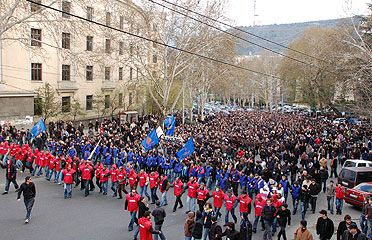
|
Protesters march from public TV towards Rustavi 2 TV on April 11. Photo: InterPressNews
|
As opposition braces for fifth day of protest rallies on April 13, one part of opposition leaders became more vocal in their calls for a dialogue with the authorities, while some of them seem to be doubtful. Views on agenda of the possible meeting also seem to vary to some extent.
Over dozen of opposition parties behind the street protest rallies launched from April 9 to demand President Saakashvili’s resignation, said Monday would mark the start of “new wave” of protests involving wider geographical area both in Tbilisi and in regions, including through more picketing of key government buildings. The opposition plans to launch the rally outside the Parliament at 3pm local time on April 13.
Nino Burjanadze, a former parliamentary speaker and leader of Democratic Movement-United Georgia party, said on April 12 that she personally had no desire to engage in talks with President Saakashvili.
“I know very well whether it is or not possible to have a dialogue with the President… No it is not possible,” Burjanadze said while speaking at the public TV’s program, Political Week, late on Sunday evening.
Asked whether her remarks meant that she was against of a dialogue, Burjanadze responded: “What we [the opposition leaders] are talking about is a dialogue on solely one issue – although truly speaking I have no desire to have talks even on this one issue with him [Saakashvili] – how the Georgian President should go painlessly and as soon as possible.”
“Who wants to talk with him [Saakashvili], let them talk with hem… As far as I am concerned, I will talk with him with great pleasure in live TV debates,” she added.
Irakli Alasania, the leader of Alliance for Georgia, which apart of Alasania’s political team also unites Republican and New Rights parties, said he was always ready for a dialogue.
“The meeting always has a sense,” he said while speaking in public TV’s weekly program, Political Week, on April 12. He also added that although the meeting might not automatically lead to the President’s resignation, “but I am always ready for the meeting and for issue-based discussion of our arguments.”
Asked what the topic of the meeting might be, Alasania responded: “We represent the will of those who are gathered there [referring to protesters] and this will determines now the political agenda as follows: early presidential elections should be held; it should be the way out of the crisis. We will sit at the negotiating table with this agenda; but we will also listen to the opinion of the opposite side; we are ready to listen to their opinion, how do they view overcoming the crisis.”
Recently Davit Gamkrelidze, leader of New Rights Party, which is part of Alliance for Georgia, said that the authorities should take concrete actions to demonstrate that it was genuinely disposed towards democratic reforms. He said that part of these actions could be replacement of a powerful Interior Minister, Vano Merabishvili; also replacement of Chairman of Supreme Court, Kote Kublashvili and return of Imedi TV station to its “legal owner” – late tycoon Badri Patarkatsishvili’s family.
Alasania said on April 12 that these issues, listed by his political partner, might be part of “package of changes” that were required for overcoming the crisis and that might be discussed if the meeting takes place with President Saakashvili.
He, however, added: “The number one issue that should be discussed is when the early presidential elections will be held.”
He said that if the authorities’ ignore these proposals by the opposition it would only further deepen the crisis.
“I am sure at some point the need will emerge for a meeting that we are offering,” he continued. “Our political, peaceful struggle will continue unless conditions are not created for a peaceful power transition and the only condition for that is early presidential election… If the society shows firmness this process will end sooner than later. If this firmness does not exist now – although I believe it exists – than this process will last, but anyway eventually this process will be accomplished.”
Asked who might participate in the meeting from the opposition, Alasania said setting up of the delegation was “a technical matter,” which was not a problem. He also reiterated that the meeting should be “public,” meaning that not only politicians, but also representatives of civil society should participate in the meeting.
This post is also available in: ქართული (Georgian) Русский (Russian)
